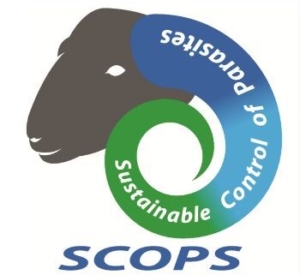SCOPS Nematodirus Forecast

Mild weather prompts nematodirus warning for sheep farmers
The rise in temperatures in recent days means an increased risk to lambs from hatching nematodirus, says the Sustainable Control of Parasites in Sheep (SCOPS) group.
Speaking on behalf of the group, sheep consultant Lesley Stubbings says: “Nematodirosis can strike very quickly so you can’t afford to have a ‘wait and see’ policy. And because the damage is done by large numbers of immature larvae that are not producing eggs, faecal egg counts are not a reliable indicator of risk. Rapid action is often required, particularly if you have 2022-born lambs grazing pasture that carried lambs last spring. Lambs typically start eating significant amounts of grass at six to 12 weeks’ of age, although this may be younger if ewes are under stress and not milking well.”
For at-risk lambs, SCOPS recommends moving them to low-risk pasture, which was not grazed by lambs last spring. Knowing this is not always possible, the alternative is treating with an appropriate anthelmintic. In most cases this is a white (1-BZ) drench, but individual producers should speak to a vet or adviser and take follow-up steps to ensure the treatment was effective.
Ms Stubbings continues: “Roundworms that are resistant to white drenches are widespread within the UK but, fortunately, this is still rare when it comes to nematodirus and these wormers are still highly effective in most cases. But remember, it may be necessary to treat lambs more than once depending on the spread of ages in a group and subsequent weather conditions.”
The risk has been highlighted within recent days, with the Animal and Plant Health Agency (APHA) reporting two confirmed cases of nematodirosis already – in two very different parts of the UK. Michele Macrelli of APHA reports: “We have already confirmed two outbreaks in South West England and the Borders of Scotland, and we expect this to increase in the coming week as temperatures rise.”
Nematodirosis is a particularly nasty disease in lambs, causing a high number of mortalities and stunting the growth of many others. It is caused by the Nematodirus battus worm, which has a different lifecycle to other sheep worms. Under certain climatic conditions it can strike very quickly, with little or no warning. This means sheep farmers have to be on their guard.
The main difference in the lifecycle of Nematodirus battus compared with other parasitic worms is that development to an infective larvae takes place within the egg and infection passes from one lamb crop to the next years’ crop. Before they can hatch, the eggs have to undergo a period of cold weather followed by warmer temperatures of 10°C or more. If these conditions occur over a short period of time, triggering a mass hatch, and it coincides with the time when lambs are starting to take in significant amounts of grass (over about six weeks old), the result can be devastating.
Ms Stubbings concludes: “It is important to assess the risk to each group of lambs based on their age, the history of the field and its aspect and altitude. South-facing fields tend to have an earlier hatch and a 100m difference in altitude will change hatching by about +/- seven days.”
SCOPS provides a free nematodirus forecast to the UK sheep industry – but it is currently unavailable. This is due to technical difficulties relating to the availability of Met Office data. SCOPS is working hard to find a solution but is currently unsure of how long the forecast may be down. Further communication will follow when it is back up and running. Under usual circumstances, SCOPS is able to provide the Nematodirus Forecast at no cost to the end-user thanks to the sponsorship of Bimeda and Techion (FECPAKG2).
The background information and nematodirus forecast are still available. See www.scops.org.uk/nematodirus.
Notes to editors: –
- This press release is issued by National Sheep Association (NSA) on behalf of SCOPS. For more information contact Katie James, NSA Communications Manager, on 07748 151235 or katie@nationalsheep.org.uk.
- SCOPS is funded by AgriSearch, AHDB Beef & Lamb, Animal Health Distributors Association (AHDA), Animal Medicines Training Regulatory Authority (AMTRA), Hybu Cig Cymru (HCC), National Farmers Union (NFU), National Office of Animal Health (NOAH), National Sheep Association (NSA) and Quality Meat Scotland (QMS). These bodies are joined by a number of experts in parasitology and sheep health to form the SCOPS Steering Group. A full list is available at www.scops.org.uk.
